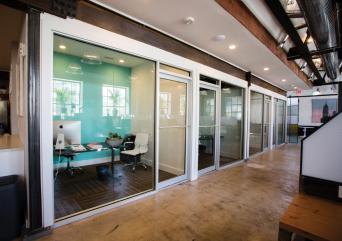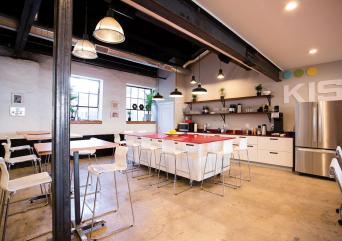
At Kismet, You Can Work Alone, Together
For more info about Kismet co-working spaces and programs, visit kismetcowork.com or call 267-934-9772.
I wasn’t looking to revolutionize my freelance work life. I didn’t know it needed to be revolutionized — I just thought I lacked discipline. When a friend told me about Kismet, the new co-working space on Willow Grove Avenue in Chestnut Hill, my thought was: Nah. I already have a desk at home.
Then I brought my laptop to Kismet for a trial day. After only three hours, I tackled Kismet’s director Richard Creamer and asked: How do I sign up? I was shocked to discover how productive I was in the right environment. After several months of Kismet membership, I’ve never questioned my decision.
The “I already have a desk” syndrome is common among freelancers, who may not realize that simply becoming part of a work community, regardless of your profession, is more energizing than coffee (though coffee is free at Kismet!) and far more motivating than, say, obsessing over why I was so unproductive in my home office, with no one to distract me but the cat.
Kismet is one door past Balance gym. Someone friendly will buzz you in. You’ll find a beautifully renovated two-story space. The use of recycled wood and industrial materials reflects not only a commitment to the natural environment, but also to the belief that the way people work can be creative. It’s sustainability on a human scale.
Owner Christopher Plant describes Kismet’s genesis: “In my work with commercial real estate, people kept asking for potentially shared spaces that didn’t exist. Eventually, I thought, ‘I should make this.’ . . . Knowing that a great co-working space relies on the right algorithm of design and functionality, I waited until I found the perfect space.”
DeskMag, an online magazine devoted to co-working, reported in January 2017 that “nearly 1.2 million people worldwide will have worked in a co-working space” by the end of the year. This includes small businesses attracted to the low overhead.
Any given day at Kismet, you might find a refugee from corporate life or from Starbucks who’s blazing a freelance trail. Represented fields include an action sports/lifestyle brand for martial arts; college guidance; general contracting; a cleaning company; an outsourced CFO; an interior branding and physical design studio; and web/industrial designers.
Friendliness in the workplace is a great thing. In a collaborative workspace, the ultimate friendliness is to respect the way informal interaction can make the whole notion of “work” lighter. In fact, the traditional walls between disciplines no longer exist. Ideas are shared, eureka! moments had. You could sit at a laptop wearing ripped cutoffs, chuckling over cute kitten videos, and nobody would huff that you’re being unprofessional. Still, everyone is here to work.
“Community” came up a lot when I asked my “colleagues” what they most like about Kismet. “The space itself is creative.” “Breaking down of silos that separate people into different industries.” “Access to amenities.” “A relaxed atmosphere.”
In its public events, Kismet draws from active community resources. We’re already connected, but we might not realize it. Well-designed evening events and inspiring speakers allow for the cross-pollination we all need for our communities to thrive and problem-solve.
Kismet’s slogan, “The Future of Work,” can be applied at the micro or macro level. Freelancers find relief from individual isolation and teams discover a collaborative space. Kismet’s message is that hope for the future is found within that most ancient human value: community.
Helen W. Mallon is a Weavers Way working member, writing coach, workshop leader and fiction writer. See her website at www.helenwmallon.com.

